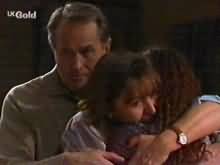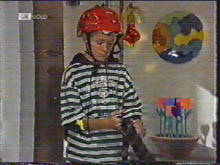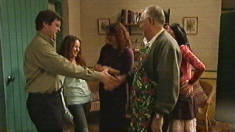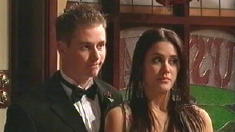|
.
Interviews
> Michael O'Rourke
Having been part of the Neighbours team for almost 15 years in one capacity or another, few people are more qualified to talk about the show than Michael O'Rourke. Here he shares his thoughts on the programme's success, as well as his own experiences in the roles of scriptwriter, storyliner and script editor.
Can you give us a background on your career and involvement in the television industry prior to Neighbours?
It was while working as a musician in Western Australia back in the 70s that I
had my first real involvement with film. A friend asked me to contribute music
and sound effects to two short films he was making and I quickly became
fascinated with the way sound and image were able to complement one another.
I’d always been a fanatical movie buff (friends have referred to it as my
‘sickness’) so these two jobs gave me the encouragement I needed to pursue my film interests more seriously. Shortly afterwards, I volunteered to help out on some short films which were being made at the Perth Institute of Film and Television. The first was a road safety film entitled Play it Safe in which the enthusiastic, but not terribly experienced, crew nearly killed their young leading man while rehearsing one of the scenes. I also made my screen acting debut in this film, playing a corpse, for which I received some very encouraging reviews. I was lying under a sheet on the streets of Fremantle – the victim of a road accident not unlike the one we nearly inflicted upon our young leading man – when the sheet was pulled back to reveal my lifeless body. Several people reminded me that Errol FLynn had also played a corpse in his film debut, but that seems to be where the similarities in our careers ended.
After directing my first short film at PIFT, I realised that making films was what I really wanted to do with my life so I sold my record shop and set off to find a film school. After travelling through the US and not finding what I was looking for, I continued on to England, where I eventually enrolled in a two year diploma course at the London International Film School. After graduation,
I worked in London as an editor, assistant director and part-time cinema manager before returning to Australia in 1988 with hopes of making my own features here.
(It was also in London that I made a comeback to ‘corpse acting’ when I repeated the role while also assistant directing from under the sheet, in a film entitled A Piece of Money, which was written and directed by my friend Marion Comer.)
How
did you come to work on Neighbours?
I’d written a children’s serial entitled The Old Man and Me, which I submitted to Grundy Television, where it seems to have been quite well-received though it somehow ended up in a bottom drawer from which it’s yet to emerge. Ray Kolle, who was then script supervisor on Neighbours, read the screenplay and gave me a lot of encouragement. I’d been hoping to pick up some freelance writing work from Grundy’s but Neighbours was the only drama they were producing at the time and unfortunately, I’d never watched it. Before doing my submission, I taped two weeks worth of episodes and watched them with a friend who was familiar with the show. She helped me understand who all of the characters were and then I took a deep breath and plunged in. Ray was very complimentary about the submission, which was a great relief because I was terribly insecure at the time (still am really). And soon afterwards he offered me my first script (Ep 1221, in which a fire nearly burned down the Ramsay House and almost blinded Harold in the process). This first script then led to an offer to join the story department.
Can you explain to us your various roles in the production of the Neighbours saga through the years?
I started as a storyliner in 1990 - when Ray Kolle was script supervisor and
Jason Daniel story editor - and it couldn’t have been a happier experience. They were both very welcoming and supportive, as were the other storyliners: Valda Marshall, Jenny Lewis, Cody Jarrett and the late Cheredith Mok. Adam Bowen joined a couple of weeks later. From the very beginning, I learned a lot about writing for television: the structuring and pacing of episodes, the development of characters, the creation of hooks and cliffhangers, etc. But not only was this an incredible learning experience, it was also a lot of fun. Gales of laughter would burst out of the conference room as we’d entertain each other with the most embarrassing moments of our lives - and of our friends and families, who often weren’t too pleased to find that their own embarrassing moments were about to be broadcast to fifty million viewers around the world.
After about a year as a storyliner, I began script editing with Barbara Angell, who was another excellent mentor. It was fascinating to see how many different approaches the writers could take to the material - how some would find humour in even the grimmest of stories, how others would subtly recap back story in order to make a cliffhanger more emotionally powerful. Again I felt privileged to be earning my living from something that was, at the same time, teaching me so much.
Since leaving the story department to go freelance in 1992 I’ve often found that the Neighbours experience has proved to be invaluable in other contexts. There was an occasion soon after leaving when I was working with a producer and director on a feature screenplay and they kept tying themselves in knots over various story points. I’d make suggestions about how to resolve these issues and they’d look at me in amazement - how had I managed to come up with this or that solution they’d wonder? It gave me great pleasure to say “Oh, it’s easy – we used to do that on Neighbours all the time.” I was a bit of a film snob at the time I joined the story department so it always pleases me now when I can help other film snobs appreciate just how much story telling ‘craft’ goes into the making of a series like Neighbours.
How
does a typical writing assignment on Neighbours work?
The freelance writers receive all of the storylines each week which allows us to keep up to date with everything that’s happening. The storylines are very thorough and research notes are usually provided to give background information on any unfamiliar subjects such as illnesses from which the characters are suffering or legal problems they may be encountering. The writer’s job is to choreograph scenes, write dialogue and make sure the episode runs to the correct length. Occasionally, I’ll have to do some research of my own in order to make sure the scenes ring true and that the dialogue is convincing. I’ve never been much of a dancer, for instance, so when I had to write the scenes where Amy was trying to convince a very reticent Lance to come dancing with her, I phoned my sister Paddy who passed on lots of dancing terminology I could use in order to sound as if I knew what I was talking about. Another time, when Madge was in intensive care and fighting for her life, I called my friend Fifi Bennett who is a nurse over in Perth. She has a lot of intensive care experience and talked me through the appropriate procedures. I was calling her from a pay phone, frantically scribbling down notes and then reading them back to her. When I ended the call, I discovered there was a woman behind me waiting to use the phone. She looked completely horrified and was obviously praying that she’d never end up in any intensive care ward that I had anything to do with!
 |
Did you ever have a hand in creating any Neighbours characters?
I was working ‘in-house’ when the Willis, Martin and Alessi families arrived in Ramsay Street (and a few others) but it was often difficult afterwards to say exactly who created which particular character. New families were usually brought in as the result of consultations between the producers and the network, but it would be the story department who would then go on to create the character breakdowns and usually also to name the family members. At other times the story department would create a character to suit a particular story, but some of these turned out to be so good on screen that they would then be brought back later as permanent cast members. Even when a storyliner would go off to write a particular character breakdown, this often took place after discussion around the conference table about what kind of a character they should be. Because of this, it would usually seem a little presumptuous to claim sole ‘creator status’.
Sometimes stories and characters would be created incredibly quickly when it was realised that a certain quality was missing from a week’s storylines. There was one occasion when, just as we were completing a block, we realised that we needed one more light story to complete it. In desperation, suggestions started flying back and forth across the conference table and we soon had a story in which Erinsborough High School’s most successful ex-student was to be invited back to deliver an important address to the current students. Lassiter’s business mogul Paul Robinson was desperate to be chosen for this and went around dropping all kinds of clumsy hints about his eligibility. To Paul’s dismay a famous politician was chosen instead, but just prior to his arrival, the politician was charged with corruption and had to pull out in disgrace. Paul very generously offered himself as a last-minute replacement but Dorothy signed up an ex-boxer named Lefty Benson instead. ‘Lefty’ turned out to be an absolute delight on screen and I remember watching that particular episode with some pride and remembering how well we’d all contributed during those five minutes of desperation.
Who have been your favourite characters to write for?
I’m always a little superstitious about choosing ‘favourites’. I much prefer to take whichever characters I’m given and then do the best I can with them. I would never have chosen to write for Amy and Lance during their dancing phase for instance (given my possibly pathological aversion to dancing). But my sister is a very keen dancer so it gave me the opportunity to call her up for ‘research purposes’ and to learn a little bit more about what was going on in her life at that point. We had several lovely long-distance phone conversations between Sydney and Perth, which we wouldn’t otherwise have had. And later, I really enjoyed what the two actors did with the scenes: Amy with that naturally seductive quality she had, and the more reserved and uptight Lance, who, when his mother asks if he’s a man or a mouse, confides that he fears he’s a mouse! The tragic look he then gave – of comic disappointment – was absolutely delightful.
Do you have any scenes or moments you wrote that you were particularly pleased with?
One of the interesting things about the collaborative nature of a show like
Neighbours is that the writer is often given credit for something the story editor or storyliner has provided in the scene breakdown or which the script editor has added in the edit. Many of my favourite moments probably wouldn’t seem all that special to anyone else. They’d often have some personal resonance for me or a hidden message to a friend or loved one. I very rarely watch my episodes with any one else around. I’m very critical of my own work and prefer to watch in isolation. The few exceptions have been when I’ve been back in Perth and have watched some episodes with my parents and grandmother. They would cheer when my name appeared at the head of the ep and would then laugh uproariously at anything resembling a joke or look appropriately grim at the serious stuff. There’d then be wild applause when the episode ended. They are a very appreciative (and demonstrative) audience my family. When my first episode was due to go to air my father went up and down the street knocking on all the neighbours’ doors, letting them know that “Michael’s ep’s on tonight”. I was very embarrassed – and very touched. The street itself isn’t a cul-de-sac, but there were many similarities - in the friendships and interactions - with that fictional suburb in which I’ve spent so much of my time.
 |
Where there ever any storylines planned that never went ahead?
Yes, there’ve been many storylines (we used to call them ‘majors’) which for one reason or another didn’t make it to the screen. I remember one which I always thought was a great story where young Toby Mangel becomes obsessed with gambling after hanging out too much with his father, Joe, and Doug Willis. He was actually better at it than they were, and there were several quite unusual directions the story went off in, but in the end, it was deemed unsuitable for a boy his age. There were all kinds of reasons why these stories didn’t make it into the series. There must have been literally thousands of them over the years - many of them created by Jason Herbison, who was unbelievably prolific. Jenny Lewis also had a real flair for them. It’s great to see that Jenny is back in the story department once again.
How important do you think the core characters - for example, Helen, Jim, Madge, Harold, Lou etc - have been to the series over the years?
It’s impossible to imagine Neighbours without them. It was the Ramsay and
Robinson dynasties which sustained the show for so many years, but of course it’s inevitable that things change. I really like the newer inhabitants of Ramsay Street but I must admit that I’m thrilled that Harold and Lou are still with us. The sense of history and continuity they bring to the show is irreplaceable.
What do you think are the strengths and weaknesses of the Neighbours format?
There is such a strong structure in place that the series really should be able to run forever. It’s a team where all of the different departments genuinely seem to be working together to make the best show possible. The rotation system within the story department seems to me to be a very good initiative. In the past, I think storyliners and script editors have sometimes remained in-house for too long. To be able to take time off to write other things and then to return refreshed for a three to six month period seems infinitely more sensible.
From a story point of view, the more experimental quality of recent times will hopefully be a way of eradicating any weaknesses from the system. There’s a tried and tested format which certainly works and can be reverted to when necessary but I’ve been very interested to read some of the more recent storylines which feature, say, a single strand, or an unusual fantasy/dreamlike quality. It’s very exciting to await the appearances of these stories ‘on-screen’. If they work, we can go further next time, if not, we’re usually already involved in another long-running story.
It was often commented upon by viewers of the show that you seemed to have a particularly good grasp of the Robinson/Martin dynasty and always seemed to be given episodes which had particular meaning to them – would you agree with this?
It’s hard for me to say really. I do know that when I worked in the story department we would have a list of the writers for the week and would often choose the writer we thought best qualified for a particular episode. I’m not sure if this continued after I went freelance, but I did enjoy writing for those characters you’ve mentioned whenever the opportunity arose. Obviously the better you know someone, the better you can write for them. In the case of the Robinsons, I’d had plenty of chances to watch them on screen, and with the Martins I was in the story department at the time they arrived in Erinsborough (after the death of Todd and the kidnapping of Helen!!!.
 |
The last year on Neighbours has seen a renewed interest in exploring the show's great backstory and history, with characters such as David Bishop, Jamie Clarke and Sky Mangel all returning. What do you think of bringing back past characters? Should Neighbours use its rich history more? Are there any characters from the past that you would particularly like to see return?
I was very excited when I read the storylines which referred to those returning characters. It gave a sense of continuity and history. I loved the idea of bringing back Jamie Clarke but missed his appearances on screen as I was overseas at the time. To bring back Kevin Harrington as David Bishop was a major coup. He was an actor who had gone on to play high profile roles in programs like Sea Change and the feature film The Dish. It was wonderful to see him returning to the show. The infant Sky Mangel was on screen during my storylining days back in the early 90s so I was very intrigued to find that she was also returning. Stephanie McIntosh, who now plays Sky as a teenager, is a terrific young actress who lights up the screen and is one of a very strong group of younger performers we have on the show at present.
As for other characters from the past, it would be very interesting to see Paul
Robinson back on Ramsay Street - someone who was once so important in this community and who might struggle to regain his former prominence. Sky’s ‘brother’ Toby could also be handy. And I must admit I always had a soft spot for Melanie so I’d be very interested to find out what she’s been up to for all these years.
 |
Coming from Ireland originally, what do you think of Ramsay Street's very own Irish resident, Connor O'Neill?
Patrick Harvey, who plays Connor, is another of the very strong young cast members we have at present. I just love to hear that accent! My Belfast-born grandmother used to be a very passionate fan of the show and was very excited when I first started writing for it. She died a few years ago and one of the most difficult scripts I ever had to write was Sarah’s wedding episode which I was writing while back in Perth for the funeral. Grannie would have loved Connor. He and Delta Goodrem performed the Irish song Carrickfergus in one of my episodes. This is the song we played at my grandmother’s funeral so it was a very emotional episode for me - another of those times when something was very important to me, but wouldn’t have resonated in quite the same way to the audience. I did love the story department’s idea that Connor would play a song down the phone line to his mother in Ireland for her birthday, and that he’d roped Delta’s character, Nina, into helping him with it.
What have you most enjoyed about your long involvement with Neighbours?
Neighbours has been special to me in many ways. It was my first professional writing job for one thing. It’s helped me to survive for about fifteen years as a scriptwriter and has taught me a lot about the writing process along the way. Greatest of all, however, have been the friendships I’ve made during my time on the show. Many of the people I’ve worked with have become very close friends.
What do you think accounts for the huge success Neighbours has continued to enjoy over the years?
The passion and commitment of the people involved. A good concept can only get you so far.
What's next for Michael O'Rourke?
I have several screenplays for which I’m currently trying to raise finance.
There’s A Perfect Lie, which is about life, love, death and golf, and which will feature my father in a small role. He has one of the most eccentric swings ever seen on a golf course. Then there’s Slippin’ Away, which is set in Western Australia, where I settled after leaving Belfast in the 60s. Another is set in County Tyrone and is the story of several visits I made back to Northern Ireland while trying to get to know my grandfather again after so many years away.
I’ve recently collaborated with friend and former Neighbours colleague Adam
Bowen on a telefeature and a series bible, and will hopefully be working again with former script editing mentor, Barbara Angell on a feature.
Early this year I worked with an Italian director named Roberto Siviero on a screenplay called Holy Tequila, which has just completed principle photography in Los Angeles. It was a very happy experience so I’m hopeful that we may get to work together again on future projects. And of course, I hope to remain involved with Neighbours for as long as they’ll have me.
Interview by Moe. Added on 14th August 2004
Back
|

